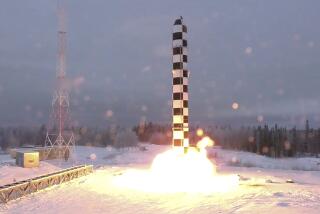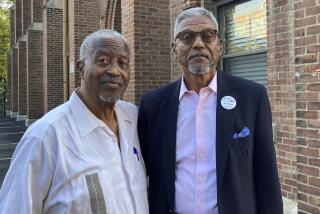Nuclear Testing
- Share via
The Clinton Administration has let it be known it may resume nuclear weapons testing at the Nevada test site (“Clinton May OK Resuming Underground Nuclear Tests,” May 16). We believe such a decision would be tragic on a global scale.
The Administration now says such tests can be conducted without damaging our national security interests. But France and Russia have both said they will resume their tests if we start again. And any realistic hope of persuading China and the other nations of the world to abandon the path of proliferation depends on our own moral position on this matter. That position will evaporate with the first explosion.
There is also serious question about whether such tests would even be legal. Moratorium legislation now in place, signed by George Bush, requires that any testing be a part of the development process for the implementation of warhead safety devices. This process is the ostensible basis on which the Department of Energy is arguing for the tests.
But the Department of Defense, which actually deploys these warheads, says it will not pay the $5 billion-$6 billion it would cost to implement the new safety features. The DOD has already taken steps to circumvent some of this technology. For example, Trident missiles are now loaded onto submarines separately from the warheads. If, as the DOD says, the weapons are now safe enough, and the new safeguards will not be deployed, the inevitable court challenges to the testing process will probably hold. Does the Administration really need all this grief?
These tests also cost serious money, $60 million each by some estimates. They impart significant quantities of radioactive pollution into the already contaminated soil of this much-abused region. And they add further insult to the Shoshone Nation, which has been trying to stop these unwanted explosions on their ancestral lands since they began there in 1951.
Bill Clinton’s choice is between prolonging the agonies of the Cold War, or becoming the first President of the Post-Nuclear Age. Elected as an agent of change, the decision should be obvious.
HARVEY WASSERMAN
CHRIS ZIMMER
Washington
The writers are nuclear campaigners for Greenpeace.
More to Read
Sign up for Essential California
The most important California stories and recommendations in your inbox every morning.
You may occasionally receive promotional content from the Los Angeles Times.













